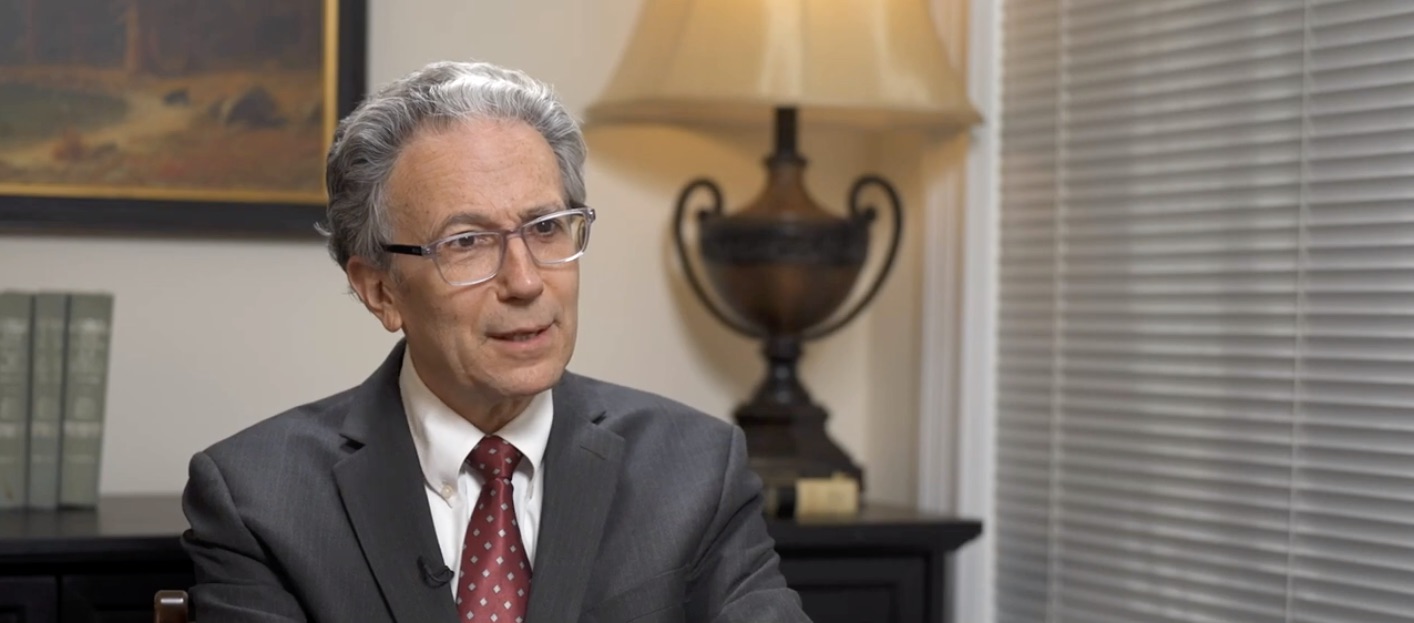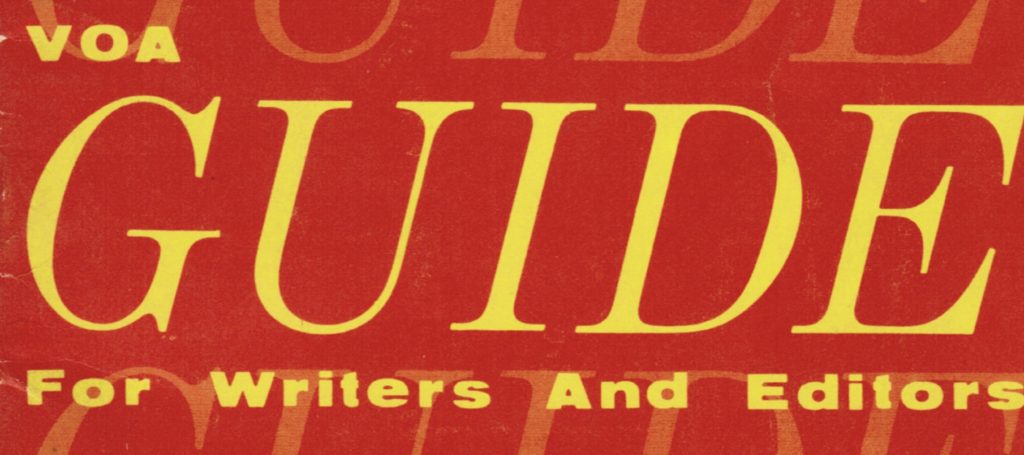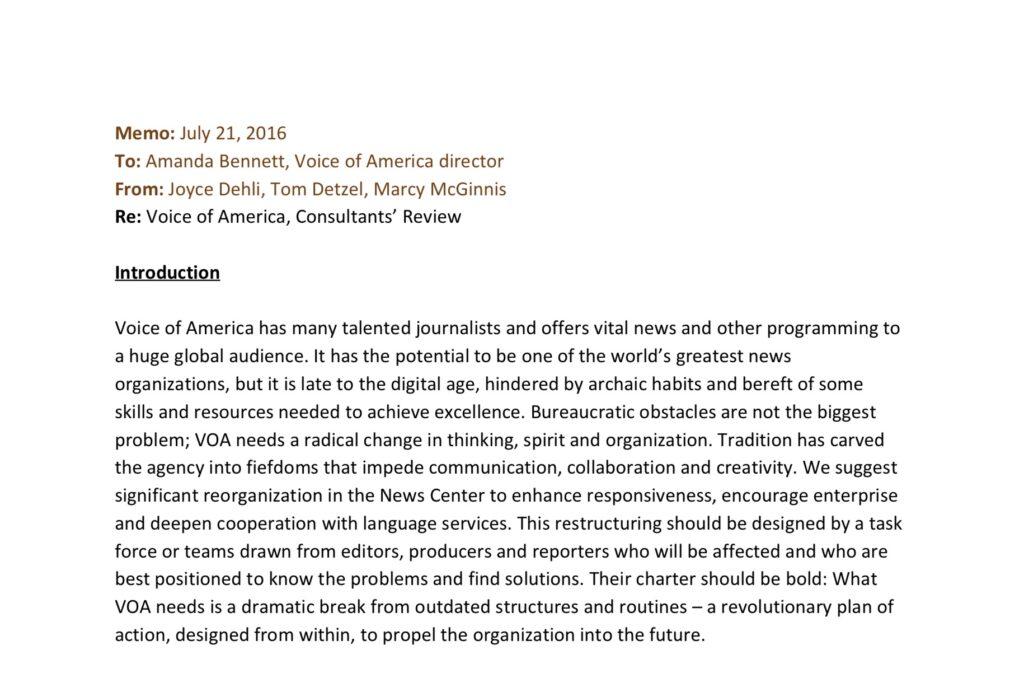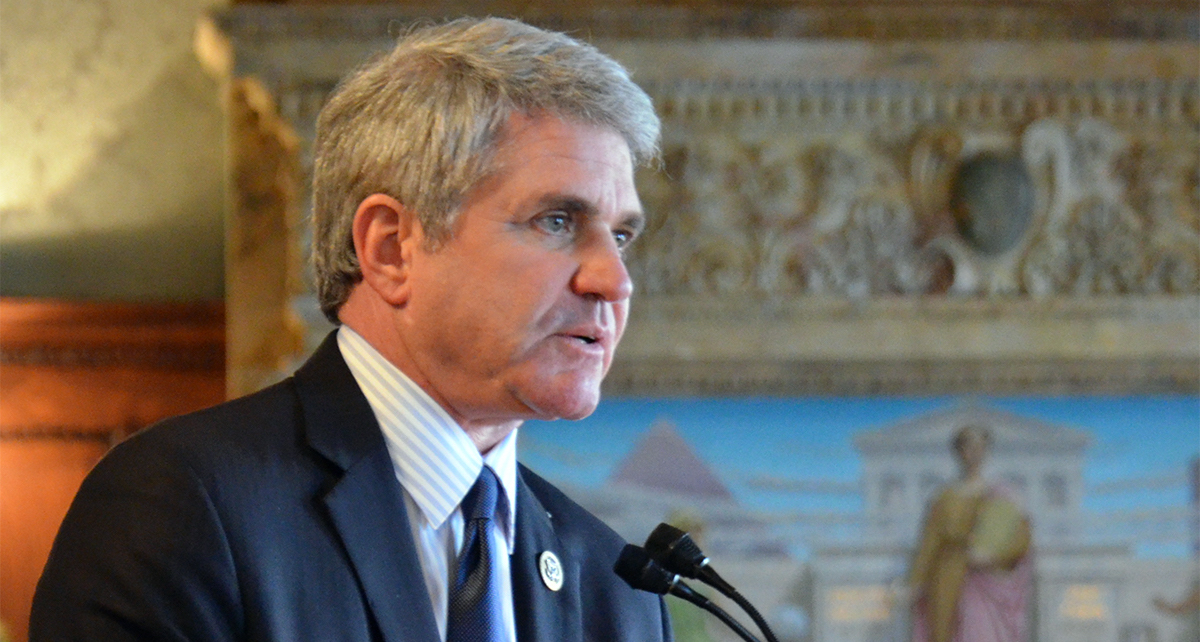USAGM Watch Commentary
Michael Pack, Trump-appointed and U.S. Senate confirmed CEO of the U.S. Agency for Global Media (USAGM), is being criticized right and left, but his explanations are rarely mentioned in mainstream media reports, which generously repeat accusations and claims of his critics but omit to mention alleged conflicts of interest and accusations made against Pack’s critics. Some of his accusers were managing the agency when then Secretary of State Hillary Clinton called it “practically defunct” and Republican members of Congress referred to it as “dysfunctional,” “rudderless” and even “worthless.” Some of them held key positions at the agency when the Voice of America (VOA) was illegally targeting Americans with Facebook ads and former agency CEO John Lansing employed as his chief strategic advisor Richard Stengel’s former highly-praised advisor at the State Department Haroon Ullah who was later convicted of stealing taxpayers’ money at USAGM and spent time in a federal prison. Stengel, former Under Secretary of State for Public Diplomacy and Public Affairs, is now the head of President-Elect Biden’s USAGM Advisory Transition Team. Bruce Sherman, another members of the advisory transition team selected by President-Elect Joe Biden for the U.S. Agency for Global Media, commissioned and promoted in 2014 a public opinion poll in Russian-occupied Crimea which was criticized for helping disinformation by Russian officials and the Kremlin’s state media propagandists. Yet another member of the transition team who had previously worked at the Broadcasting Board of Governors (BBG), as the U.S. Agency for Global Media was called before 2018, reportedly accumulated an enormous foreign and domestic travel bill at the agency. We might add that some of the former BBG Board chairmen and members did corporate business in Russia and China while overseeing the agency’s media outreach to these countries. Spouse of a former VOA Director was also reported to be doing business in China.
It is fair to say that Michael Pack has become a partisan issue, which apparently frees many reporters and commentators from checking the veracity of claims against him and from seeking balance. Pack is accused of firing journalists, but so did some of his critics when they were in charge of the agency. Michael Pack said in an interview that he is reviewing the case of the “VOA Mandarin Five”–several journalists in the VOA China Branch who were fired by the former management after a dispute with then VOA Director Amanda Bennett who accused them of insubordination–charges they strongly deny and claim that pressure from the communist government in Beijing contributed to their dismissal. Pack reportedly has taken steps to rehire some of these journalists. He is accused of being pro-Trump, which he obviously is, but some of his critics were accused of being excessively pro-Biden and pro-liberal that they allowed frequent violations of the VOA Charter to continue under their watch over several years. Some of them tolerated employment at the agency of journalists who previously had produced anti-U.S. Russian propaganda.
Pack said that “VOA and the other networks need to be fair, objective and balanced. Not pro-Trump, not pro-Biden, not pro-anybody.” Such statements from him are rarely reported or analyzed in most mainstream liberal media reports and commentaries.
We at USAGM Watch are not interested in defending or helping Pack, but we are committed to truth, balance and a comprehensive presentation of facts. When we express opinions, we label them as such, but we leave any conclusions to our readers. We try to be fair to all sides on all issues, but we challenge and point out misleading statements, omissions of material facts and propaganda.
In an effort to achieve balance, we present here some of Michael Pack’s views from a recent interview with Jan Jekielek of The Epoch Times, views of some of his critics, and analyses by former Voice of America (VOA) journalists and managers Dan Robinson and Ted Lipien who are co-founders of the BBG – USAGM Watch website and have been observing and studying the agency and VOA for many years.
Michael Pack: So one of the most egregious examples of bias that we found is a clip that was on the VOA [Voice of America] Urdu Service … It was on all VOA social media: Facebook, Twitter… . It is essentially a Biden ad. This was during the [2020] presidential election here in the United States.
Its [USAGM’s] mission is to fulfill American foreign policy broadly considered, promote American ideas and institutions, especially to promote ideas like freedom and democracy around the world. And it does it in three ways, summed up in the VOA Charter, but applies to the others [USAGM’s media entities] as well.
First: they need to report the news in an objective and balanced way, not one side or the other, unbiased. Number two: they have to explain and talk about American values and institutions, to explain them to the rest of the world. And number three: they need to present the administration’s viewpoint, along with criticism of it, but they need to present it forthrightly and clearly. And my goal is really to make sure they fulfill that mission. It’s been my sense that they have not been fulfilling it adequately enough over the last several decades.
Since I have come to the agency we have found egregious examples of both mismanagement and bias. And I have tried to address those.
To me [VOA Urdu Service pro-Biden video] it’s more than just biased. It was really an ad for then candidate Biden. As you can see, he’s the only one talking. There is no one interviewed from the Trump campaign. And it’s really an appeal to Muslims in Michigan to vote for candidate Biden. In fact, most of it comes from a Biden ad, and then it’s labeled VOA. It even says that Muslims in Michigan are enough to turn the state for Biden. I think it’s completely inappropriate. It violates the VOA Charter. It may violate the Hatch Act that does not allow government employees to campaign for a candidate, especially on their work time, and it may violate the Smith-Mundt Act that prohibits my organizations from broadcasting directly to the American people and targeting them.
One thing we found is just a lax attitude toward security, period. … We found out that over a ten year period the Office of Personnel Management and the Office of the Director of National Intelligence have been telling the agency that it was improperly clearing people, giving them security clearance, giving them access to computers and badges, as well as people with higher security clearances, secret and above, were inadequately cleared. And even after the OPM and the ODNI told them to stop clearing people, the agency continued to clear people. They would, in some cases not bother to take fingerprints, make up social security numbers. They would OK people whose forms were incompletely filled out … 1,500 have problematic security clearances, a huge number. It’s a security problem of a scale that OPM had never seen in its time. Our security clearance authorization has been revoked. It’s only happened to two agencies in 20 years.
They are part of the federal government and they need to follow the security guidelines of the federal government. And I think this lax attitude shows up across the board of things. Yes, it would be different perhaps if they were not working for the federal government, but they are. Sometimes the people who work here would rather not remember that they work for the federal government, but the purpose of the agency is to cover news in an objective and balanced way. But the goal is to further the foreign policy goals of the United States broadly considered. We don’t take instructions from the State Department what to cover and I would never tell a journalist what to do and what to report. But the reason the American people are spending 800 million dollars [annually] is that the agency is supposed to advance American interests, broadly. Not Democratic interests or Republican interests, but advance them broadly.
Jan Jekielek: When I look at a lot of the numerous accusations that you face, to me they seem to boil down to this idea that you’re trying to institute a pro-Trump bias at the agency.
Michael Pack: I’m really not. I’m totally committed to the mission. I want there to be no bias. It’s true that we’ve been very critical of pro-Biden, pro-Democratic [Party] pieces, like the Urdu piece you showed earlier. But asking for one kind of bias to be eliminated is not pushing for another kind of bias. I would be against pieces that are biased in favor of Trump too if we had seen them. VOA and the other networks need to be fair, objective and balanced. Not pro-Trump, not pro-Biden, not pro-anybody. Thy need to be fair and balanced. People have taken this criticism badly, they don’t like to be criticized, and they have chosen to portray it that I want a pro-Trump bias. But I have never asked for any pro-Trump piece to be run. It’s true that I’m a Trump-appointee. I voted for the president. But I have never asked journalists to cover him in any particular way. Neither has anyone on my team.
Criticism of Michael Pack
A totally different picture of Michael Pack and his motives emerges from some of the media reports, including those by the Voice of America, which is one of the three federal agency entities. The USAGM itself is a federal entity. The latest federal element within USAGM is VOA. The second federal entity is the Office of Cuba Broadcasting (OCB) which oversees Radio and TV Marti transmissions to Cuba.
Brian Schwartz reported today on CNBC that “President Donald Trump’s federal media agency CEO is attempting one last purge before Joe Biden is sworn in as the next commander-in-chief.” The CNBC report also states that Michael Pack, the CEO of the U.S. Agency for Global Media, is “pushing for the removal of agency officials whom he previously put on administrative leave.”
The whistleblower complaint against Pack was filed in September to the State Department’s inspector general and the U.S. Office of Special Counsel, a federal agency watchdog. People listed on the complaint include Grant Turner, the agency’s former interim CEO, who then became the group’s chief financial officer; Matthew Walsh, the deputy director of operations; and Shawn Powers, the chief strategy officer.
The complaint notes that the executives named on the legal document “were all concurrently placed on administrative leave.” It goes on to allege that Pack targeted these executives for “retaliatory action … because of his belief that they held political views opposed to his, which is a violation of the Hatch Act.”
The U.S. Office of Special Counsel, according to National Public Radio, recently disclosed that it had found “a substantial likelihood of wrongdoing” at USAGM since Pack became the chief executive.
READ MORE: Trump loyalist Michael Pack plots final purge at federal media agency before Biden takes office. By Brian Schwartz, CNBC, December 7, 2020.
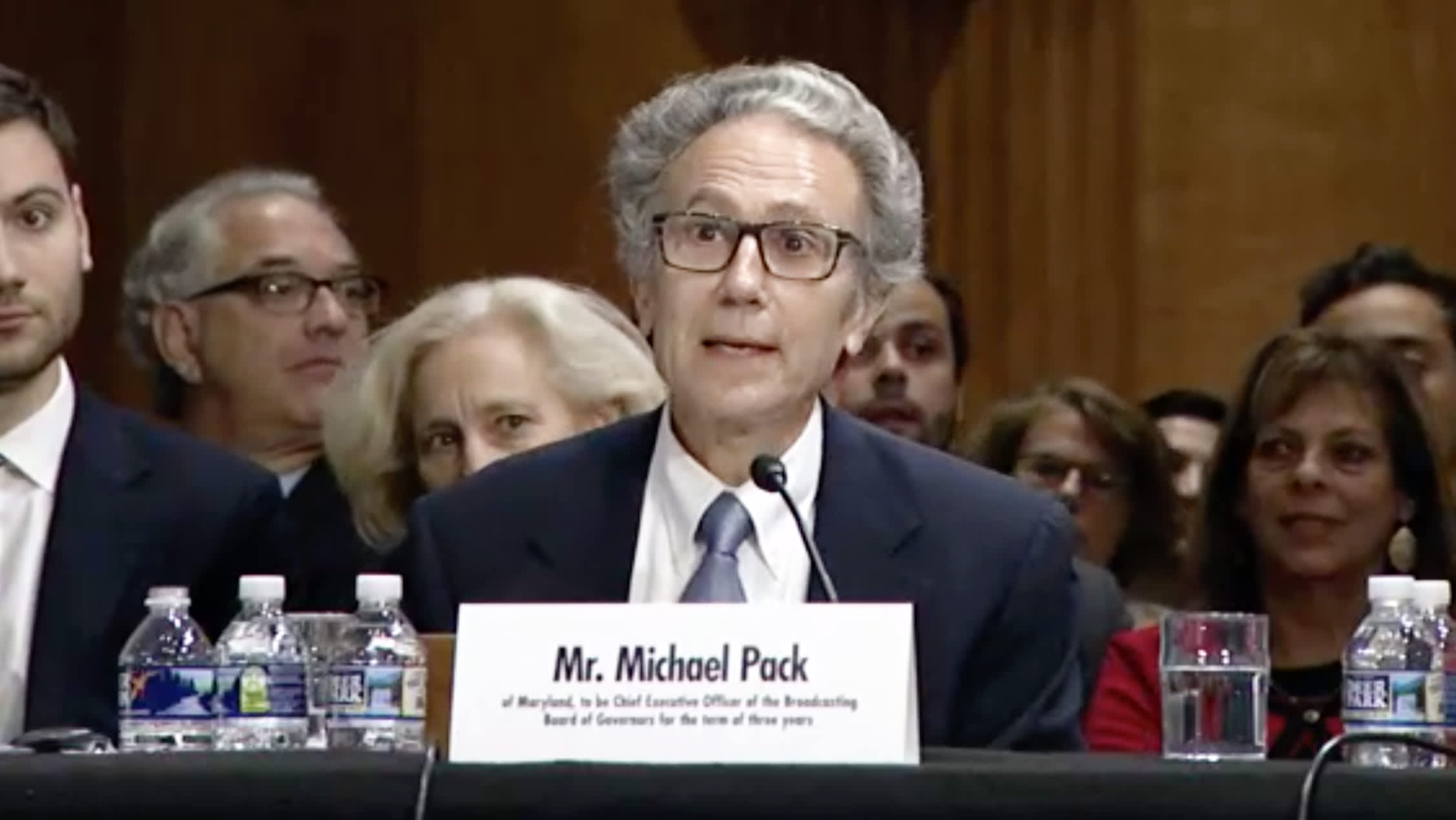
Mark G. Pomar, who from 1982 to 1993 worked as assistant director of the Russian Service at Radio Free Europe/Radio Liberty (Munich), director of the U.S.S.R. Division at the Voice of America, and executive director of the Board for International Broadcasting, a federal agency that oversaw Radio Free Europe/Radio Liberty, published an analysis of various issues in the U.S. international media agency, but he was also highly critical of current USAGM CEO Michael Pack.
Then, in the summer of 2020, U.S. international broadcasting experienced another hit when the Trump administration appointed Michael Pack as the CEO of the U.S. Agency for Global Media. Rather than develop a comprehensive media strategy that advanced U.S. national security interests, Pack began his tenure by firing the heads of four of the entities — RFE/RL, Middle East Broadcasting Networks, Radio Free Asia, and the Office of Cuba Broadcasting — without offering any reasons for his actions. The top two editors of the Voice of America resigned before he even took office. Pack also ousted diplomats and professional journalists on oversight boards and refused to extend the visas of more than 70 foreign journalists on dubious grounds of national security. He rescinded the firewall rule that prohibited the CEO from engaging in editorial oversight of the broadcasters. As an essay in the Washington Post noted, Pack’s “objection [was] to the rule’s prohibition of attempts by USAGM [U.S. Agency for Global Media] executives to ‘direct, pressure, coerce, threaten, interfere with, or otherwise impermissibly influence any of the USAGM networks … in the performance of their journalistic and broadcasting duties.” So egregious was Pack’s frontal assault on the fundamental integrity of U.S. international broadcasting that at the height of his presidential campaign, Democratic presidential candidate Joe Biden vowed to fire him on his first day in office, noting that Pack’s actions “risk hijacking invaluable nonpartisan media institutions that stand up for fundamental American values like freedom and democracy in the world.”
READ MORE: A U.S. Media Strategy for the 2020s: Lessons from the Cold War. By Park G. Pomar, Texas National Security Review, Winter 2020/2021.

Jessica Jereat, Voice of America press freedom editor, wrote a largely negative report on Michael Pack. The VOA report did not reflect Pack’s views and his interpretation of his actions. It also had no references to numerous accusations and reports of bias and mismanagement at the Voice of America under the previous leadership. The VOA reporter wrote that “USAGM did not respond to VOA’s request for comment,” but she did not utilize previous interviews and statements by Pack or his spokespersons.
VOA NEWS
USAGM Told to Investigate Allegations of Wrongdoing at Agency
By Jessica Jerreat
December 03, 2020 07:33 PM
A federal office set up to protect whistleblowers has ordered the federal agency that oversees Voice of America and other independent news networks to investigate allegations of wrongdoing by its own top officials.
The December 2 letters, signed by an attorney in the Office of Special Counsel, said U.S. Agency for Global Media head Michael Pack has been ordered to investigate after the OSC found “substantial likelihood of wrongdoing” based on details in whistleblower complaints.
Since Pack’s appointment to the USAGM in June, network heads have been fired or resigned, Pack has stopped approving visa renewals for the agency’s foreign journalists, and his political appointees have conducted internal investigations of reporters and editors.
The letters are a further blow to the new CEO after a federal court issued a preliminary injunction prohibiting Pack and his appointees from interfering with editorial decisions or violating journalists’ First Amendment rights.
Pack and his appointees were also barred from conducting investigations into news content or journalists, and from making personnel decisions involving individual staff members. The order is a stopgap measure to prevent further actions being taken until a legal complaint that alleges wrongdoing is resolved.
USAGM did not respond to VOA’s request for comment.
The OSC is an independent federal agency set up to help protect so-called whistleblowers, or those federal employees who report allegations of wrongdoing in their workplaces. It can order investigations but does not have power to take disciplinary action.
The OSC sent more than 10 letters to attorneys or organizations representing whistleblowers. One of those, the Government Accountability Project (GAP), is representing more than 20 complainants at USAGM and VOA, most of whom request anonymity.
“The OSC letters represent a compilation of whistleblower complaints,” David Seide, senior counsel at GAP, told VOA.
Letters issued to two representatives of whistleblowers, which have been viewed by VOA, list the same allegations, including:
— Repeated USAGM violations of the VOA firewall that protects the network’s independence.
— Gross mismanagement, including the firing of network heads at Radio Free Asia, Radio Free Europe/Radio Liberty, the Middle East Broadcasting Network and Office of Cuba Broadcasting, and at the Open Technology Fund.
— Replacing a bipartisan board with political appointees and making the CEO the chair.
— Reassigning the VOA standards and best practices editor.
— Revoking security clearances of six USAGM officials.
— Refusing to renew J-1 visas to international journalists, which the letter said was “endangering both the continuity of agency operations and those individuals’ safety.”
— Improper hiring freezes and allegations of illegally repurposing or pressuring staff to repurpose congressionally approved funds.
— Prohibiting offices, including the general counsel, from communicating with outside parties without the consent of the front office.
“The OSC letters show that an independent federal agency — OSC — has agreed that our clients have shown a substantial likelihood of wrongdoing by agency political leadership,” Seide told VOA. “This is a significant step, far from the last one.”
A federal agency typically has 60 days to investigate the complaints and report back to the OSC, and it can request an extension. The final OSC findings are sent to Congress and the U.S. president.
The OSC letters direct the USAGM head to investigate the agency. If Pack should resign or be removed from his position, the investigation would still continue.
Pack was confirmed by the Senate as CEO in June with a three-year term. However, after Pack fired several news executives upon his arrival, a spokesperson for the Joe Biden presidential election campaign told VOA that if elected, Biden would fire Pack.
Pack failed to appear for a September House of Representatives hearing examining the controversy at USAGM, drawing criticism from both Republican and Democratic lawmakers.
Representative Eliot Engel of New York, chair of the House Foreign Affairs Committee, told VOA last month, “I’m confident the Biden administration will appoint a competent leader at USAGM who understands our international broadcasting efforts, respects the law and can reverse the damage Mr. Pack has done during his short tenure.”
The OSC told VOA it was unable to comment on or confirm open investigations.
In the letters, the OSC said that while it believed the complaints appeared to show likelihood of wrongdoing, the investigation remained open.
Heads of federal agencies are required by law to investigate cases in which the OSC believes there appears to be substantial likelihood of wrongdoing.
The role that Pack might play in investigating USAGM actions under his watch wasn’t clear.
Often the Office of Inspector General is asked to handle the investigation, but agency heads have discretion to use other investigative bodies.
END OF VOA NEWS REPORT
Critics of partisan bias in Voice of America programs, who see it as a major violation of the VOA Charter, say that the current VOA newsroom has been overwhelmingly pro-Biden. According to these critics there are very few conservative journalists left in the VOA central newsroom and those who are left are afraid to speak up for fear of being ostracized by their colleagues and denied promotions by their superiors. One individual, identified as “USAGM Staffer,” spoke with former VOA senior correspondent Dan Robinson who recorded and posted the USAGM staffer’s observations on the BBG – USAGM Watch website.
SIDEBAR: Where 2016 Consultant Report Recommendations Missed The Mark
USAGM Watch Commentary
EDITOR’S NOTE: A USAGM staffer reacts to key aspects of the Executive Summary of the 2016 consultant report solicited by and submitted to former VOA director Amanda Bennett. The full report, paid for by U.S. taxpayers, has not been found and produced by the agency despite repeated requests by journalists.
Bias in News [from 2016 Consultant Report]
“The perception of biased coverage is real among multiple VOA reporters and editors. Biased coverage threatens the credibility of the overwhelming majority of VOA journalists who strive for fairness, balance and accuracy. It’s vital that VOA leadership take visible steps to communicate that bias is unacceptable and that the integrity of VOA reporting is sacrosanct.”
USAGM Staffer: It’s not enough to acknowledge there is “bias” and say it needs to be dealt with. If you can’t name the TYPE of bias that exists, how can you expect VOA management to take “visible steps” to fix it? The most serious bias problem that VOA has had for years has been the left wing/liberal bias of its almost exclusively liberal-minded journalists in favor of Democrats and against Republicans and conservatives. There is no reference to that problem in this summary. As a result, the anti-bias “training” that Bennett ordered her staff to take in the following years was worthless, because (based on what I witnessed) the training course did not not involve any study of the MANY examples of pervasive liberal bias in VOA’s actual reporting. The course merely looked at bias as a general problem that journalists should try to avoid. So, trainees who didn’t think there was anything wrong with their own liberal bias, and who were not confronted during the course with EXAMPLES of that bias, would not have been inclined to change the way they did their jobs in the slightest. And as you can see from VOA’s reporting on U.S. politics this past election year, that’s exactly what happened.
Recommendations on bias from 2016 Consultant Report
❏ Create a safe avenue for staffers to report bias concerns without fear of reprisal.
Regularly remind staffers about the responsibility to report perceived bias. Put division
directors on notice that that they will be held accountable for bias in their services.
USAGM Staffer: The English News Center has NOT been held accountable at all for its liberal bias, because it has flagrantly continued and flaunted that bias for the past 4 years. Also, there are NO safe avenues for staffers to report liberal bias, because News Center managers have shown themselves, in their regular emails to staff, to be of one ideological mindset, and to be defiant in the face of criticism from Trump and Michael Pack, rather than being humble in the face of criticism, looking in the mirror, and soliciting constructive criticism from their peers. When staffers see this kind of messaging from their newsroom leaders, HOW can they have faith that their legitimate concerns will be considered seriously? On the contrary, they would be rightly concerned about being ridiculed and ostracized for going against the party line.
❏ Consider more frequent content audits to determine if bias is evident.
USAGM Staffer: I don’t know of any such audits that have been conducted in the past 4 years.
❏ In communications about bias, clarify the difference between bias and aggressive
accountability reporting. Tough, authoritatively sourced coverage that calls out abuses
of power is not biased
USAGM Staffer: Wrong. Even aggressive accountability reporting NEEDS to fairly reflect the views of the people who are alleged to have abused their power (and perhaps even the views of their supporters), as distasteful as those views might be to the journalists doing the reporting. The ethical requirement for a journalist to eschew bias isn’t thrown out the window just because you as a VOA journalist, and many other like-minded people, want to “go after” a person in power.
Dan Robinson, former senior White House correspondent from 2010 to 2014 who served as bureau chief in Nairobi, Kenya and Bangkok, Thailand and was also the chief of the VOA Burmese Service and the Capitol Hill correspondent, obtained a partial agency document showing that political bias was uncovered at the Voice of America by independent consultants already in 2016, but the full report has not been made public by the agency’s management and cannot be found.
2016 Report Confirmed Problem of Political Bias At Voice of America
OPINION
Trump USAGM CEO Michael Pack Was Attacked For Attempts to Focus on Problem
by Dan Robinson
It was May of 2016 and Amanda Bennett was only a few weeks into what would become a nearly four year stint as director of the Voice of America, among the “plum” jobs in Washington, D.C.
Bennett was just getting her feet wet, and at the time was dependent on a group of longtime embedded VOA managers that she would at one point describe as a “fantastic leadership team.”
She had received fair warning, from former VOA employees and extensive reporting by the independent watchdog website BBG and USAGM Watch, of disturbing issues at VOA, located in what has long been one of the most dysfunctional of federal agencies.
Some VOA journalists were using their taxpayer-funded positions to engage in self-promotion and campaign for political causes, a fact little known to most Americans. VOA’s website and digital operations were plagued by failures in breaking news coverage, and inaccuracies in content.
Both VOA and what was then called the Broadcasting Board of Governors (BBG) were increasingly seen by U.S. lawmakers as moribund. A Republican-led and eventually bipartisan effort in Congress proposed major restructuring – there was little patience left on Capitol Hill where the agency was increasingly considered to be “broken,” “rudderless,” and “worthless.” President Obama signed the reform legislation in December 2016 to create a powerful agency CEO position and to make the BBG Board purely advisory.
In a meeting with one former VOA reporter, Bennett asked how anyone could know if VOA was succeeding or not, as if incompetence in covering breaking news, on-air mistakes, and management dysfunction would not be visible to outsiders.
Bennett would not have left her former life to take over a notoriously troubled agency with seemingly intractable problems, to focus just on the negatives.
That preference notwithstanding, on May 23rd 2016 she sent a memo to staff announcing the hiring of three consultants: Joyce Dehli, Tom Detzel, and Marcy McGinnis.
Dehli was a co-chair of the Pulitzer Prize Board. Bennett herself had been part of a Pulitzer winning newspaper reporting team, a fact that boosted her credibility with VOA’s government-paid civilian journalistic force. She is married to former Washington Post publisher and businessman Donald E. Graham. As then chairman of The Washington Post, he was a Pulitzer Prize Board member in the 2000s, as was Bennett. She was then editor of Lexington Herald-Leader, later editor of The Philadelphia Inquirer, and at the end of her time on the Pulitzer Prize Board, executive editor of Enterprise, Bloomberg News.
The memo described Detzel as having led award-winning investigative teams at ProPublica, and collaborated on projects with The Washington Post, The New York Times, and PBS.
McGinnis had been a Senior Vice President, News Coverage, at CBS News, and had helped launch Al Jazeera America.
As Bennett told it in her memo, this short-term consultant team had a wide-ranging mission: “To assist us in benchmarking our entire operation to the best in the world” and “digging deep into all our journalism on all platforms.”
Panel members would have “access to our written work, both web and mobile; to listen to our broadcasts; to watch our shows and to engage with our social media” and would “[have] a free hand in asking to interview anyone they want, and to hold meetings of any groups they feel they need to learn more about or from.”
Between the date of the Bennett memo and today at the end of 2020, no final report by the consultant group or any of its findings is known to have ever been distributed to VOA and USAGM staff.
If any final report actually does exist, VOA and USAGM management have done their best to bury it – a product paid for by taxpayer funds has been hidden from public view and potential media scrutiny.
In 2018, I submitted a Freedom of Information Act (FOIA) request to USAGM, then still headed by John Lansing (who now heads National Public Radio) requesting a range of electronic and written records relating to the consultant panel.
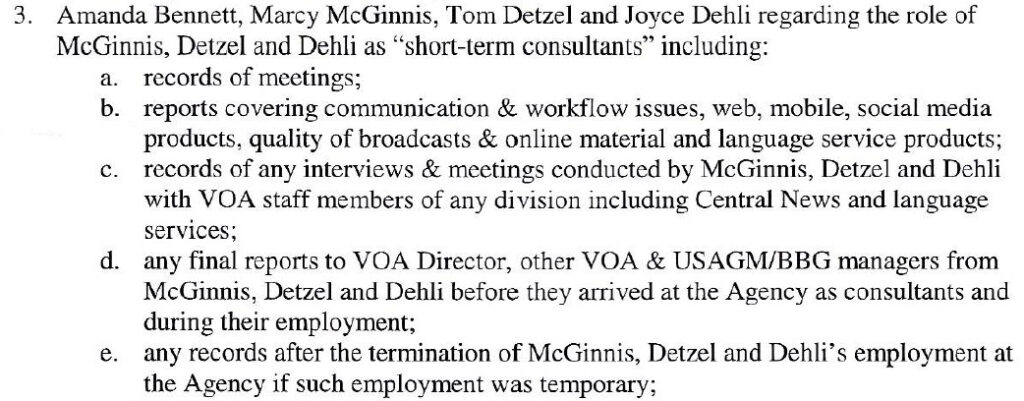
USAGM slow walked this and other FOIA requests, applying a familiar tactic employed when government agencies seek to avoid wider disclosure – saying the requests were over-broad and imposed an unacceptable burden on staff.
Fast forward to 2020. I have discovered that staff of USAGM CEO Michael Pack attempted to learn from agency managers whether any written record existed of the consultant panel’s work.
Almost immediately, I was told that roadblocks were erected by longtime senior officials at 330 Independence Avenue (the VOA and USAGM headquarters) who denied knowledge of any final report, or an executive summary.
However, this reporter finally obtained a copy of the Executive Summary the consultants sent to Bennett and we present its contents here.
It’s details confirm the depth of problems at VOA, especially regarding an issue that USAGM CEO Pack attempted to focus on – political bias by VOA’s taxpayer-funded staff.
EXCERPT FROM EXECUTIVE SUMMARY
“The perception of biased coverage is real among multiple VOA reporters and editors,” the summary stated. “It’s vital that VOA leadership take visible steps to communicate that bias is unacceptable and that the integrity of VOA reporting is sacrosanct.”
Asserting that the “overwhelming majority of VOA journalists . . .strive for fairness, balance and accuracy” the consultants nonetheless urged Bennett to create “a safe avenue for staffers to report bias concerns without fear of reprisal”.
They also recommended regular reminders to staffers “about the responsibility to report perceived bias,” and “[putting] division directors on notice that they will be held accountable for bias in their services.”
And the summary said there should be more frequent content audits to determine if bias is evident, and [in communications about bias] “clarify the difference between bias and aggressive accountability reporting.”
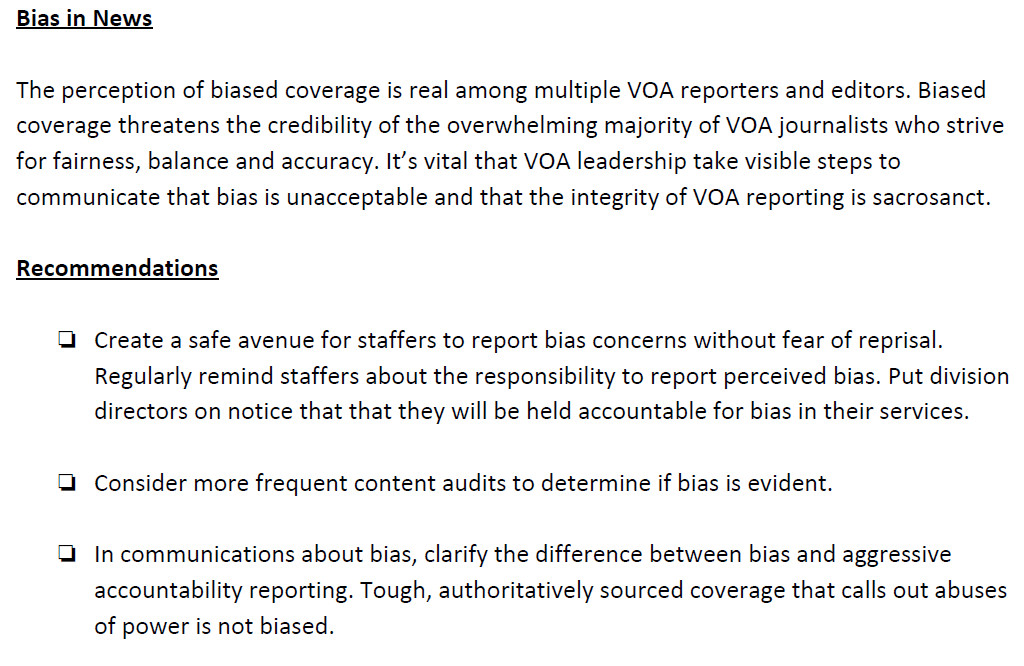
The significance of the emergence of the report summary cannot be over-stated.
At the very beginning of her four years as VOA director, Bennett and others with access to the full report, and this summary, were made fully aware of the kind of issues involving that BBG and USAGM Watch had reported on for years.
What followed is part of the historical record: the problem of political bias in the reporting of VOA journalists, and in their social media feeds, continued in the first term of Donald Trump. Things worsened as the 2020 presidential election approached.
Bennett ordered all VOA staff to undergo training (provided by an outside contractor) in avoiding political bias in reporting. These sessions continued as of mid-2020, with employees warned of negative repercussions in their personnel files should they choose not to participate.
“VOA’s Best Practices Guide” was repeatedly updated – sometimes it seemed in direct response to BBG and USAGM Watch reporting – to reflect changes aimed at dealing with what seemed like an out-of-control bias situation.
Already facing a tsunami of attacks by elite left-leaning media for decisions he made since becoming CEO, Michael Pack issued a statement in late 2020 seeking to enforce existing rules or, as his critics have charged, exert control over what some VOA reporters were doing in their reporting and on social media. An agency spokesman said that the CEO’s memo was “clarifying long-standing agency Conflicts of Interest and Social Media policies” and that “No new policies were established.”
Titled “Guidance on Conflicts of Interest” the memo stated that it would be a conflict of interest for any agency journalist “to participate personally and substantially in reporting on an issue: (1) in which they have a personal interest or (2) have publicly personally expressed a political opinion.”
Again, recall that BBG and USAGM Watch had revealed political bias in VOA reporting and social media posts, including online activity by some of VOA’s highest-visibility journalists which violated the VOA Charter.
We have been directed to other examples in some of VOA’s bureaus, and by staff in some VOA language services. BBG and USAGM Watch reporting over at least the last five years is replete with such examples.
Pack’s memo noted that VOA’s own standards and practices stated that journalists “are expected to remain neutral and objective in all public appearances and public spaces, including social media . . . and try to avoid conduct or activity that would call into question your neutrality and objectivity as well as the neutrality and objectivity of VOA.”
The new guidance recommended that any VOA journalist “reporting on or otherwise working on a story regarding “X” situation” should “avoid publicly voicing your personal opinion about that situation because such activity may call into question your credibility as a journalist and could compromise VOA’s reputation as a reliable and credible news organization.”
Supervisors, Pack added, should enforce a need for reporters to recuse themselves from covering certain issues if they are “personally affected by a potential governmental action”.
It could have been a reference to a VOA language service reporter who questioned a Trump National Security Council official about Michael Pack’s cancellation of J-1 work visas held by some VOA staff members. USAGM did not renew the reporter’s U.S. visa. He asserted that his report from the White House had been “censored” by VOA’s central newsroom.
The memo also addressed the issue of VOA reporters using social media accounts to indicate personal disagreement with government policies, recommending that they recuse themselves “from reporting on the Department and the part of the Administration implicated by the criticism.”
Any VOA journalist “who expresses personal views on political topics in their personal social media creates the potential for a conflict of interest and should consider whether recusal or mitigation is required.”
For example, a VOA journalist who on Facebook “likes” a comment or political cartoon that aggressively attacks or disparages the President must recuse themselves from covering the President.
Of course, this guidance caused enormous controversy and became part of a challenge in the courts to Pack’s management of USAGM – even though it sought to address violations of VOA’s own long-standing standards by the organization’s journalists.
Back to the executive summary. It contains some telling words. Remember the objective of this panel was to do a deep dive into every aspect of VOA’s journalistic operations.
Ultimately they wrote, “one can judge Voice of America’s success or failure by its content. Does the quality meet professional standards? Is it relevant to VOA’s diverse audiences? Is it distinctive? Does it connect with audiences in the most apt formats, from digital news and social media to podcasts, radio and TV? Finally, does it serve VOA’s mission to tell America’s story abroad and to cover global regions and peoples not otherwise served by uncensored news organizations?”
EXCERPT FROM EXECUTIVE SUMMARY
“Too often the answer to these questions is no. VOA content varies widely in quality and relevance but is often routine, mediocre and late. It frequently lacks the context, sourcing, sophistication and production values today’s audiences demand. Investigative stories, data journalism, long form narrative and in depth video storytelling are largely absent.“
“VOA continues to be hindered by archaic habits and bereft of some skills and resources needed to achieve excellence. Bureaucratic obstacles are not the biggest problem; VOA needs a radical change in thinking, spirit and organization. Tradition has carved the agency into fiefdoms that impede communication, collaboration and creativity.“
Since she left VOA, with her deputy, just as Michael Pack was arriving at USAGM, Bennett has spent many hours in numerous online Zoom events sponsored by liberal and media think tanks, making a case for excellence of VOA news products.
Specifically, Bennett has claimed that VOA is an impactful investigative reporting force. Interestingly, one of the members of the consultant team ended up at VOA in charge of an investigative reporting unit.
But it’s not like VOA investigative stories have produced consistent banner breaking news headlines. As I and other outside observers have noted, VOA and the greater USAGM have nowhere near the financial, sourcing and reputational capabilities of major news organizations required to be seen as a major force in this area.
As for major restructuring recommended by the consultants, Bennett accelerated a process already underway of enhancing cooperation across stove piped sections of VOA. The report called for a “dramatic break from outdated structures and routines – a revolutionary plan of action, designed from within, to propel the organization into the future.” Between 2016 and 2020, some of VOA’s foreign language services produced multimedia content which included political ads against Donald Trump, in favor of Hillary Clinton, and in favor of Joe Biden.
The full executive summary of the consultants report is provided here for readers. But the message from its conclusions was clear in 2016, and warrants attention – especially from the transition team representing President-elect Joe Biden – as we near 2021.
The headline in 2016 was quite clear: Decades after the end of the Cold War, and many years of attempting to establish itself as a consistent major global media force in the digital age, VOA was still failing in 2016. And not much has changed between 2016 and 2020.
As Amanda Bennett heard in 2016 as she was taking up her position at VOA, it was one thing to want to focus on positives, quite another to be open to seeing and hearing the fullest possible picture of problems at this historically dysfunctional agency.
Here’s the bigger question: WHERE IS THE FULL REPORT ON WHICH THE EXECUTIVE SUMMARY WAS BASED?
It’s possible that there was only a paper copy of the full report. But there must be some electronic traces and references to it, and to the executive summary.
Remember, all of this was paid for with taxpayer dimes. If someone deleted electronic agency email traffic pertaining to the original report and/or the summary that would raise a question of potential destruction of government records that could have been subject to FOIA requests.
The full 2016 consultants report is a work product that needs to be seen in its entirety by the public and media. If anybody within the agency retained copies, they need to make these available to the senior management. They should be then released to inquiring media.
The full report to the former VOA director represents an important document for American taxpayers to see and assess, so they can make their own judgments as to the full extent of the dysfunctions identified. The USAGM Advisory Transition Team appointed by President-Elect Biden also should see and analyze the full report.

Dan Robinson retired in 2014 after 34 years with the Voice of America. In addition to his assignment as senior White House correspondent from 2010 to 2014, he served as bureau chief in Nairobi, Kenya and Bangkok, Thailand. He was also the chief of the VOA Burmese Service and the Capitol Hill correspondent. Views expressed here are his own.
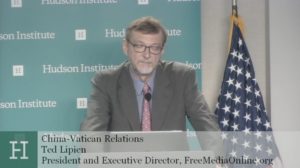
Former Voice of America (VOA) acting associate director Ted Lipien, who is a co-founder and supporter of BBG – USAGM Watch, argues in an new Washington Examiner op-ed that most of U.S. mainstream media have mislead Americans about what is going on at the $800 million U.S. Agency for Global Media (USAGM) which oversees and loosely manages VOA’s international and increasingly U.S. domestic news reporting and commentary. Domestic media outreach is not part of the congressionally-mandated Voice of America mission, but it happens thanks to the internet and social media and is open for abuse. According to Lipien, who also worked at VOA and for the Broadcasting Board of Governors (BBG), which was USAGM’s former name, as VOA Polish Service chief, VOA Eurasia Division director and BBG regional marketing director, there have been massive violations of the VOA Charter in the last several years which may have affected outcomes of some U.S. elections. VOA’s Charter, which is U.S. law, requires the Voice of America to represent all of America, not any single segment of American society.
WASHINGTON EXAMINER
‘Voice of One America’ is against US law
OPINION
By Ted Lipien
November 30, 2020 07:00 AM
There are two Americas, one left-leaning liberal America and one right-leaning conservative America. But the taxpayer-funded Voice of America, VOA, in the $800 million U.S. Agency for Global Media not only reflects but also represents just one of them — illegally.
Americans whose information comes only from the Voice of America itself, the Washington Post, the New York Times, CNN, MSNBC, or NPR have no idea what really goes on in the VOA newsroom. They may have been convinced by now that VOA is VOT (Voice of Trump) because his appointee, Michael Pack, has been in charge of USAGM for several months. The truth is that VOA has been consistently VOB (Voice of Biden), but liberal media outlets failed to notice and report these violations of U.S. law.
While I hope that Joe Biden’s win will be good for America and the world, and I have no problem whatsoever with Voice of America reporting accurately on criticism of President Trump’s policies and his often controversial statements and actions, I am absolutely against VOA’s federal government employees interfering in U.S. elections with partisan propaganda at my expense as a taxpayer.
VOA’s domestic impact needs to be studied and measured because any intentional interference in U.S. elections by VOA officials and journalists is illegal. I do not want a pro-Biden VOA Urdu Service 2020 campaign ad costing Trump and Republicans support among U.S. ethnic voters in Michigan and elsewhere, just as I do not want VOA to help Trump and Republicans win in any elections. As an immigrant, a refugee from communism, and a former VOA journalist and manager during the Cold War, I know very well how much good VOA can do if it can focus on its essential mission abroad and not waste energy and money on electioneering in the United States — an illegal activity which both Democratic and Republican lawmakers and all honest journalists should strongly condemn.
Amid VOA’s persistent violations of U.S. law, Democrats in the Senate blocked Pack’s confirmation vote for three years and allowed these violations to continue. The agency was still run until June 2020 mostly by holdover Obama officials. Americans might have gotten the impression from media reports that these officials heroically protected VOA’s independence and were unjustly put by Pack on a punitive administrative leave. They might have learned also that U.S. Federal District Judge Beryl A. Howell ruled recently that Michael Pack had tried to interfere with VOA content and told him to stop it. This is not quite true.
It is in my view a good thing that the judge had made an initial attempt to define the still-unclear boundaries of the so-called editorial “firewall” between VOA and the head of its federal agency, but she also said that Pack probably had the right to replace USAGM administrators and to take other measures as the principle manager of U.S. international broadcasting. This was mentioned only in passing, if at all, in most media reports, which also failed to explore what may have been behind Pack’s actions. Liberal journalists who know almost nothing about VOA automatically attributed his motives to malice and loyalty to President Trump.
I suspect most of them could not even imagine that a Trump-appointed official could have been trying to protect the VOA Charter. Although the so-called “firewall” prevents direct contacts between USAGM managers and journalists under most circumstances, interference in U.S. elections at U.S. taxpayers’ expense definitely violates VOA’s basic law — the 1976 VOA Charter — in a much more profound way.
Pack maintains that he has done nothing wrong in addressing the reported violations of the VOA Charter. He only revoked the firewall regulations that the old Broadcasting Board of Governors put in place hours before his swearing-in. VOA had functioned without these additional regulations for many years. Pack told reporters he was addressing mismanagement and lax enforcement of laws and regulations by the previous agency leadership team. Agency sources also said that they did not approach VOA journalists directly but went through the acting VOA Director Elez Biberaj.
As someone who managed many VOA programs over several decades, I believe Pack has a duty to bring balance to VOA but may have received poor advice on a still-unclear matter of law. Pack should have relied on the acting VOA Director to deal with these problems according to the established policies and procedures. He claims that he did so. He also could have hired a permanent VOA Director who would enforce the rules of good journalism and the VOA Charter fairly and without any partisan bias. Pack is telling reporters that he did not hire a new VOA director because all of those he approached, who had the gravitas for the job, said, “talk to me after the election.”
While Pack’s behavior was presented by his critics as threatening toward VOA journalists, VOA has not changed its unbalanced anti-Trump coverage. There has been no major change since Michael Pack took over as USAGM CEO, although his presence may have stopped some of the most blatant violations of the VOA Charter. With Biden’s win, the real danger is that VOA will continue to be a voice against conservative America.
I believe that Voice of America’s illegal political propaganda targeting U.S. voters may have had an impact on outcomes of U.S. elections in some states. One video posted by VOA condoned physical violence against Trump and could have intimidated some voters. Media outlets, instead of taking the word of journalists who were behaving badly, should have analyzed current and past VOA news reports and looked at multiple scandals at VOA and the agency, including the firing of VOA Mandarin Service journalists under former VOA Director Amanda Bennett and former USAGM CEO John F. Lansing.
VOA’s Charter, which is U.S. law, requires the Voice of America to represent all of America, not any single segment of American society. Years of hiring of like-minded left-wing journalists have left the VOA central English newsroom almost completely empty of mainstream conservatives. A few who stayed have told me that they do not dare to challenge their bosses and colleagues in public because they fear being ostracized and denied promotions. But apparently, one of them published anonymously a comment on the University of Southern California public diplomacy blog that “Taxpayers (especially conservative ones) should not stand for VOA continuing to be the ‘Voice of Biden’ ‘Voice of Liberal America,’ as it has been for all of 2020 and basically all of the Trump presidency. If taxpayers knew what VOA really has become — a partisan news outlet that consistently ignores & marginalizes conservative voices in America — and if they realized that they are all paying for it, they might be furious.”
Another current or former VOA journalist observed: “We’re violating our Charter by only representing liberal America, no matter where our audiences are, be they overseas or in the U.S. And because VOA content is accessed by many people in the U.S. (a fact that cannot be disputed), it makes matters even worse, because taxpayers are essentially funding liberal propaganda that can influence domestic politics, whether that is VOA’s intention or not.”
Ted Lipien is a former Voice of America acting associate director.


